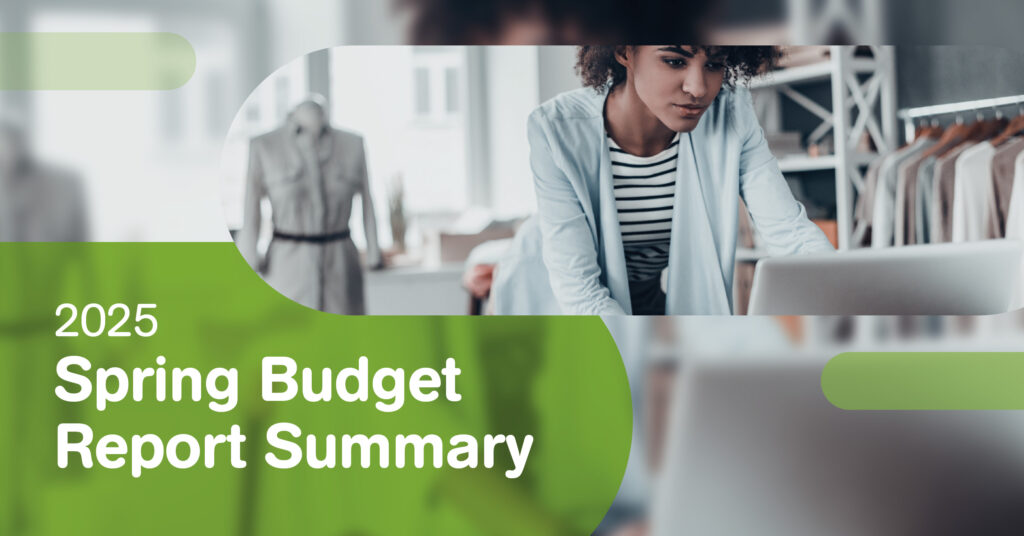On Wednesday 26th March 2025, Chancellor of the Exchequer Rachel Reeves delivered the Spring Budget Statement. As previously pledged, the Chancellor reiterated her commitment to one major fiscal event per year to ensure greater certainty and stability for families and businesses.
While there were no headline tax changes, there are still plenty of important updates that could impact individuals and businesses. Here’s a clear, jargon-free breakdown of the key points.
Government Spending & Reform
The government reaffirmed its commitment to increasing defence spending, with plans to raise it to 2.5% of GDP by 2027. An additional £2.2 billion has been allocated to the Ministry of Defence next year to help meet this target.
Changes to the welfare system are also on the horizon. The Universal Credit health element will be frozen for existing claimants and reduced for new claimants from 2026. At the same time, the standard allowance will increase above inflation from 2026 onwards. There will also be more checks in place to verify claimants’ income, savings and expenses.
A new £3.25 billion Transformation Fund has been announced to help public sector bodies operate more efficiently, including a planned integration of NHS England into the Department of Health and Social Care.
Housing & Growth
To support the goal of building 1.5 million new homes, the government is putting an extra £2 billion into social and affordable housing for 2026/27. A further £625 million has been earmarked for training programmes in the construction industry, aiming to produce up to 60,000 skilled workers during this Parliament.
Tax Overview
There are no immediate changes to income tax rates or thresholds. These will remain frozen until April 2028. Scottish residents continue to be taxed under their own banded system, which includes a top rate of 48%.
For non-domiciled individuals, major reforms are coming. From April 2025, the current remittance basis will be replaced with a new residence-based tax system. Those moving to the UK will receive tax relief on foreign income for their first four years of residence, provided they haven’t been UK tax residents in the previous ten years. A temporary repatriation scheme will allow previous remittance users to bring money into the UK at a reduced tax rate.
National Insurance Contributions
From April 2025, employers will see their National Insurance rate rise from 13.8% to 15%, and the earnings threshold at which this applies will drop to £5,000. On the positive side, the Employment Allowance will rise to £10,500, and eligibility will expand to more businesses.
Employment & Wages
From 1 April 2025, the National Living Wage will increase to £12.21 per hour for those aged 21 and over. For 18 to 20-year-olds, it will rise to £10.00 per hour, marking a significant 16.3% increase – the biggest ever in both cash and percentage terms.
Company Cars & Benefits
The benefit-in-kind tax rate for zero-emission company cars will rise from 2% to 3%. Other cars will see a 1% increase. Importantly, from April 2025, double cab pick-up vehicles will be treated as cars for tax purposes, impacting how they are taxed and depreciated.
Capital Gains Tax
Capital Gains Tax (CGT) rates have increased, with the basic rate rising to 18% and the higher rate to 24%. Business Asset Disposal Relief will increase to 14% from April 2025, and to 18% from April 2026. The annual CGT exemption remains fixed at £3,000.
Inheritance Tax (IHT)
The nil-rate bands for IHT remain frozen until April 2030, including the standard £325,000 band and the £175,000 residence nil-rate band. From 2027, unused pension funds and death benefits will become part of the taxable estate.
From April 2026, business and agricultural property will qualify for 100% relief up to £1 million, with any value beyond that receiving 50% relief. This also applies to certain quoted shares not listed on a main market.
Business & Digital Tax
Corporation Tax remains unchanged. Companies with profits over £250,000 will continue to pay 25%, while small companies earning less than £50,000 will pay the 19% small profits rate. The Annual Investment Allowance remains at £1 million, and full expensing rules continue for qualifying new equipment.
Making Tax Digital (MTD) for Income Tax will expand in stages. From April 2026, it applies to those earning over £50,000; in 2027, over £30,000; and by 2028, anyone earning over £20,000. New penalties for late payments will also be introduced.
Changes to Furnished Holiday Lettings
From April 2025, the special tax regime for Furnished Holiday Lettings (FHL) will be scrapped. This means FHL income will be treated like other rental income, losing various tax advantages such as pension contribution relief and capital gains tax rollovers. Some transitional rules will apply to protect past reliefs in specific cases.
Are changes in the Annual Budget going to affect you? Download our full Budget Report for even more detail.
If you’re unsure how these updates may affect your business or personal finances, our team is here to help.
Get in touch with us today for clear, practical advice tailored to your situation.
